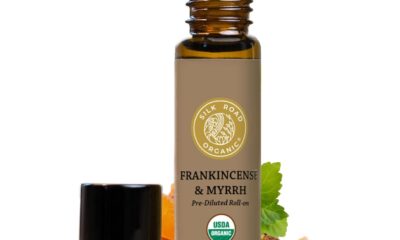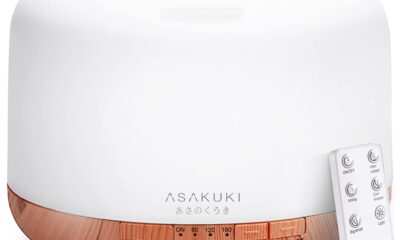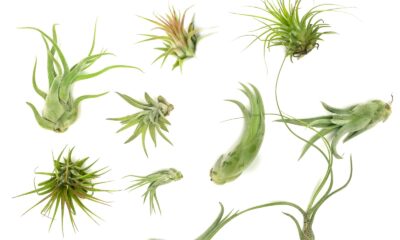Herbal Tea
Which Herbal Teas Are Good For Digestion And Constipation
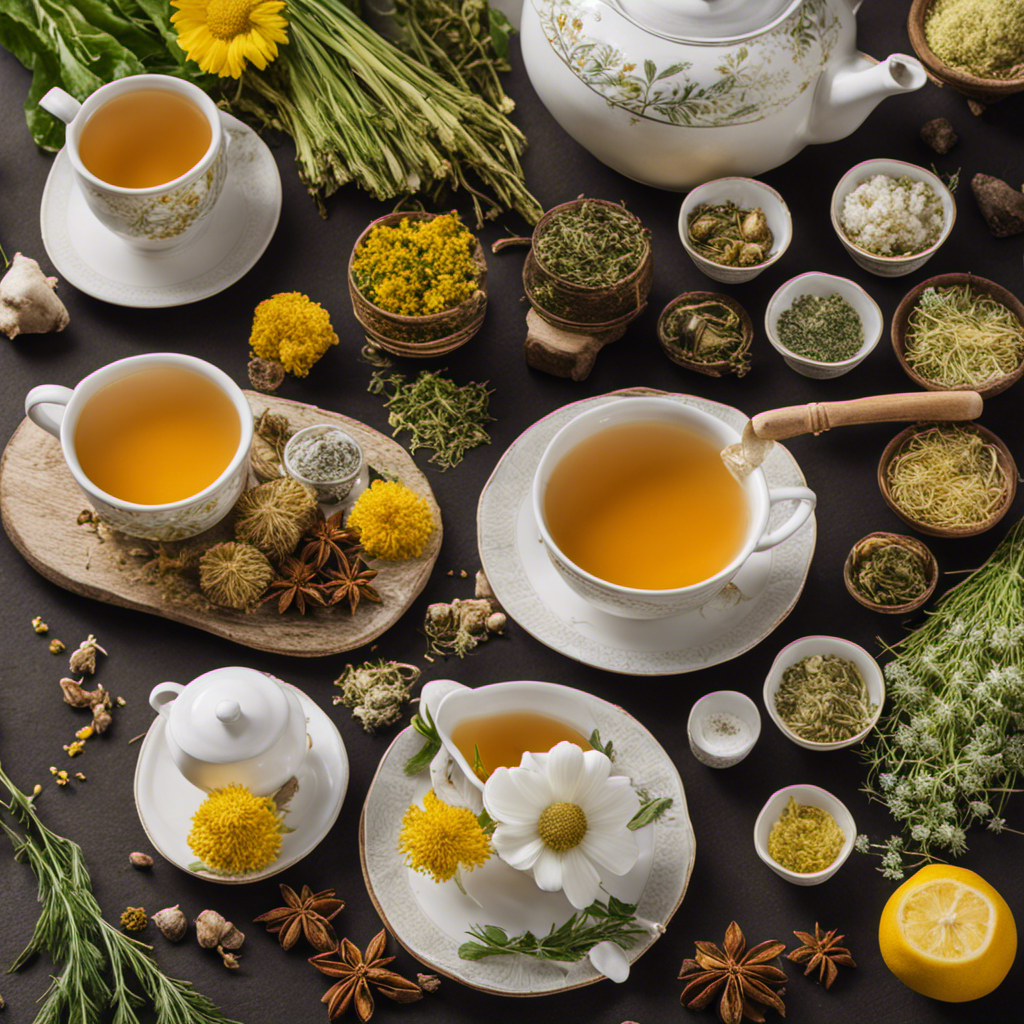
Were you aware that an estimated 60-70 million individuals in the United States are affected by digestive disorders? This is a significant number, underscoring the critical need for discovering natural solutions to promote a well-functioning digestive system.
In this article, I will explore the world of herbal teas and their potential benefits for digestion and constipation. Herbal teas have been used for centuries as a natural remedy for various ailments, and their soothing properties can be particularly beneficial for digestive issues.
From peppermint and ginger to chamomile and fennel, I will delve into the science behind these teas and how they may help alleviate digestive discomfort.
So, if you’re looking for a gentle and natural way to support your digestion, join me as we explore the world of herbal teas and discover which ones may be the perfect fit for your needs.
Key Takeaways
- Peppermint tea is beneficial for digestion and constipation, as it eases abdominal pain and improves bowel movements in IBS patients.
- Herbal teas, in general, have positive effects on digestion and can have antispasmodic properties, relaxing gastrointestinal muscles and relieving IBS symptoms.
- Peppermint tea can be a safe and natural alternative to medication for managing IBS symptoms, providing relief from abdominal pain and improving the quality of life for IBS patients.
- Peppermint tea is a versatile and well-tolerated beverage that can be easily incorporated into a balanced diet for IBS management.
Peppermint Tea
Peppermint tea is a fantastic choice when you’re looking for a herbal remedy to soothe your tummy troubles and get things moving smoothly. It’s been used for centuries for its various health benefits.
One of the key benefits of peppermint tea is its ability to relieve bloating. The menthol in peppermint tea acts as a muscle relaxant, helping to reduce spasms in the digestive tract that can cause bloating.
Additionally, peppermint tea has been found to have antimicrobial properties, which can help to alleviate symptoms of indigestion and promote a healthy gut. So, if you’re experiencing bloating or digestive discomfort, reach for a cup of peppermint tea to find relief.
Now, let’s move on to the next herbal tea on our list: ginger tea.
Ginger Tea
Ginger tea, with its soothing warmth and spicy kick, can work wonders for your digestive system and help ease any discomfort you may be experiencing. Ginger has been used for centuries as a natural remedy for digestive issues such as bloating, indigestion, and nausea. It contains compounds like gingerol and shogaol, which have anti-inflammatory and antioxidant properties that can promote healthy digestion.
Research suggests that ginger tea may also help in relieving constipation by stimulating the digestive muscles and improving bowel movements. To make ginger tea, simply steep fresh ginger slices or ginger powder in hot water for about 10 minutes. You can also add lemon or honey for added flavor.
So, let’s move on to the next herbal tea that can aid in digestion – chamomile tea.
Chamomile Tea
If you’re looking for a soothing and calming beverage that can also aid in digestion, chamomile tea is a fantastic choice. Chamomile tea has been used for centuries as a natural remedy for various digestive issues, including indigestion, bloating, and stomach cramps. It contains compounds like bisabolol and chamazulene, which have anti-inflammatory properties and can help relax the muscles of the gastrointestinal tract.
Additionally, chamomile tea is known for its calming effects, which can help reduce stress and anxiety, both of which can contribute to digestive problems. To make chamomile tea, simply steep a chamomile tea bag or a teaspoon of dried chamomile flowers in hot water for about 5 minutes. You can also add honey or lemon for added flavor.
Next, we’ll discuss the benefits of fennel tea.
Fennel Tea
Fennel tea, with its subtle licorice flavor, is like a comforting embrace for your digestive system. This herbal infusion has been used for centuries to promote healthy digestion and relieve constipation.
Fennel contains compounds like anethole, which has been shown to relax the muscles of the gastrointestinal tract, easing digestion and reducing bloating. It also has carminative properties, which means it can help alleviate gas and colic.
To make fennel tea at home for constipation relief, simply steep one teaspoon of crushed fennel seeds in a cup of hot water for about 10 minutes. You can drink this tea up to three times a day to support healthy digestion.
Now, let’s move on to the next herbal tea on our list, dandelion tea.
Dandelion Tea
Dandelion tea, with its unique earthy flavor, offers a refreshing alternative to traditional herbal infusions and has been enjoyed for its numerous health benefits for centuries. This tea has been known to aid digestion and relieve constipation. Its natural diuretic properties help to flush out toxins from the body, promoting a healthy digestive system. Dandelion tea is also rich in antioxidants, vitamins, and minerals, which support overall digestive health.
To make dandelion tea at home, simply steep dried dandelion leaves in hot water for about 10 minutes, strain, and enjoy. Adding a touch of honey or lemon can enhance the taste.
Now, let’s move on to the next herbal tea, licorice root tea, which also has its own unique benefits for digestion and constipation.
Licorice Root Tea
Licorice root tea, known for its sweet and soothing taste, has been used for centuries to support a healthy digestive system and alleviate gastrointestinal issues. This herbal tea is derived from the roots of the licorice plant, which contains compounds that have been found to possess numerous health benefits. Licorice root has been shown to have anti-inflammatory properties, which can help reduce inflammation in the digestive tract and promote better digestion. Additionally, licorice root tea may have a mild laxative effect, making it beneficial for those experiencing constipation. However, it is important to note that licorice root tea should be consumed in moderation, as excessive intake may lead to side effects such as high blood pressure and low potassium levels. Now, let’s move on to the next section and explore the benefits of a peppermint and ginger tea blend.
Peppermint and Ginger Tea Blend
If you’re looking to spice up your tea routine, why not try a delightful blend of peppermint and ginger? This soothing herbal blend not only offers a refreshing taste but also provides numerous digestive health benefits.
Peppermint has long been recognized as a natural remedy for indigestion, helping to relax the muscles of the gastrointestinal tract and relieve symptoms such as bloating and stomach discomfort. Ginger, on the other hand, is known for promoting healthy digestion and relieving constipation. Together, these two ingredients create a powerful combination that can aid in soothing digestive issues.
- Peppermint and ginger tea can help alleviate bloating and stomach discomfort.
- The combination of these herbs may improve overall digestion.
- The tea can help relieve constipation and promote regular bowel movements.
- Peppermint and ginger have anti-inflammatory properties that can benefit the digestive system.
- This herbal blend can be a gentle and natural way to support digestive health.
Transitioning into the subsequent section about ‘lemon balm tea,’ another herbal tea with its own unique benefits.
Lemon Balm Tea
Lemon balm tea is a soothing herbal remedy that can help reduce digestive discomfort. I’ve personally found that drinking a cup of lemon balm tea after a meal helps ease bloating, gas, and indigestion. Research suggests that lemon balm tea may also be beneficial for individuals with irritable bowel syndrome (IBS), as it can help alleviate symptoms such as abdominal pain and cramping.
Reduces Digestive Discomfort
Peppermint tea, known for its soothing properties, can help reduce digestive discomfort – but have you ever wondered if it can also alleviate bloating? Bloating and gas are common digestive problems that many people experience. Fortunately, there are natural remedies that can provide relief.
Herbal teas, such as peppermint tea, are known for their ability to soothe an upset stomach and ease bloating. Peppermint contains compounds that relax the muscles of the gastrointestinal tract, allowing for easier digestion and reducing the symptoms of bloating. Additionally, peppermint tea has been found to have antimicrobial properties, which can help combat the bacteria that contribute to bloating.
So, if you’re looking for a natural remedy for bloating and gas, give peppermint tea a try. It may just be the solution you’ve been searching for.
Now, let’s move on to how peppermint tea eases symptoms of irritable bowel syndrome (IBS).
Eases Symptoms of Irritable Bowel Syndrome (IBS)
Imagine finding relief from the painful symptoms of irritable bowel syndrome – peppermint tea can be your saving grace. This herbal tea has been shown to ease abdominal pain and improve bowel movements, making it a great choice for those suffering from IBS.
Peppermint contains menthol, which has antispasmodic properties that can relax the muscles of the gastrointestinal tract. This can help to reduce cramping and discomfort that often accompany IBS. Additionally, peppermint tea can help to regulate bowel movements, preventing both diarrhea and constipation.
It’s important to note that while peppermint tea can be beneficial for many people with IBS, it may not work for everyone. It’s always a good idea to consult with a healthcare professional before incorporating any new herbal remedies into your routine.
Frequently Asked Questions
Can herbal teas completely cure digestion and constipation issues?
While herbal teas can provide relief for digestion and constipation issues, they may not completely cure them. It’s important to consider herbal tea alternatives and explore other natural remedies for digestion to address the underlying causes.
Are there any side effects of consuming herbal teas for digestion and constipation?
There are potential risks and interactions with medications when consuming herbal teas for digestion and constipation. It is important to consult with a healthcare professional before incorporating them into your routine.
How long does it usually take for herbal teas to show results in improving digestion and relieving constipation?
Like a gentle breeze on a sunny day, herbal teas can bring relief to digestion and constipation. Factors like individual differences and tea quality can influence their effectiveness, but they offer numerous benefits for overall gut health.
Can pregnant women consume herbal teas for digestion and constipation?
Pregnant women should be cautious when consuming herbal teas for digestion and constipation. While some herbal teas may be safe, it is important to consult with a healthcare professional to ensure their safety and effectiveness.
Can children safely consume herbal teas for digestion and constipation?
As a parent, I understand the importance of finding safe options for children’s digestion. While herbal teas can have benefits, it’s crucial to consult a pediatrician for guidance and explore herbal tea alternatives.
Conclusion
In conclusion, herbal teas can be a soothing and effective remedy for digestive issues and constipation. With their natural properties, teas like peppermint, ginger, chamomile, fennel, dandelion, licorice root, peppermint and ginger blend, and lemon balm can provide relief and promote healthy digestion.
These herbal concoctions act as gentle healers, offering comfort like a warm embrace on a cold day. So, when your tummy feels troubled, let these herbal teas work their magic, bringing harmony and balance back to your digestive system.
Noah, the Editor-in-Chief at Cappuccino Oracle, plays a pivotal role in shaping the voice and vision of our renowned platform. With an unwavering passion for coffee, coffee alternatives, and tea, Noah leads Cappuccino Oracle towards new horizons in the realm of coffee journalism.
Beyond his professional responsibilities, Noah serves as a mentor and guiding force for his team. His dedication to journalistic excellence and genuine love for coffee, coffee alternatives, and tea continue to inspire and motivate the Cappuccino Oracle family. In the ever-evolving world of these beverages, Noah’s leadership ensures that our platform remains at the forefront, delivering enlightening and enjoyable content to our readers worldwide.
Herbal Tea
Soothing Secrets of Herbal Tea
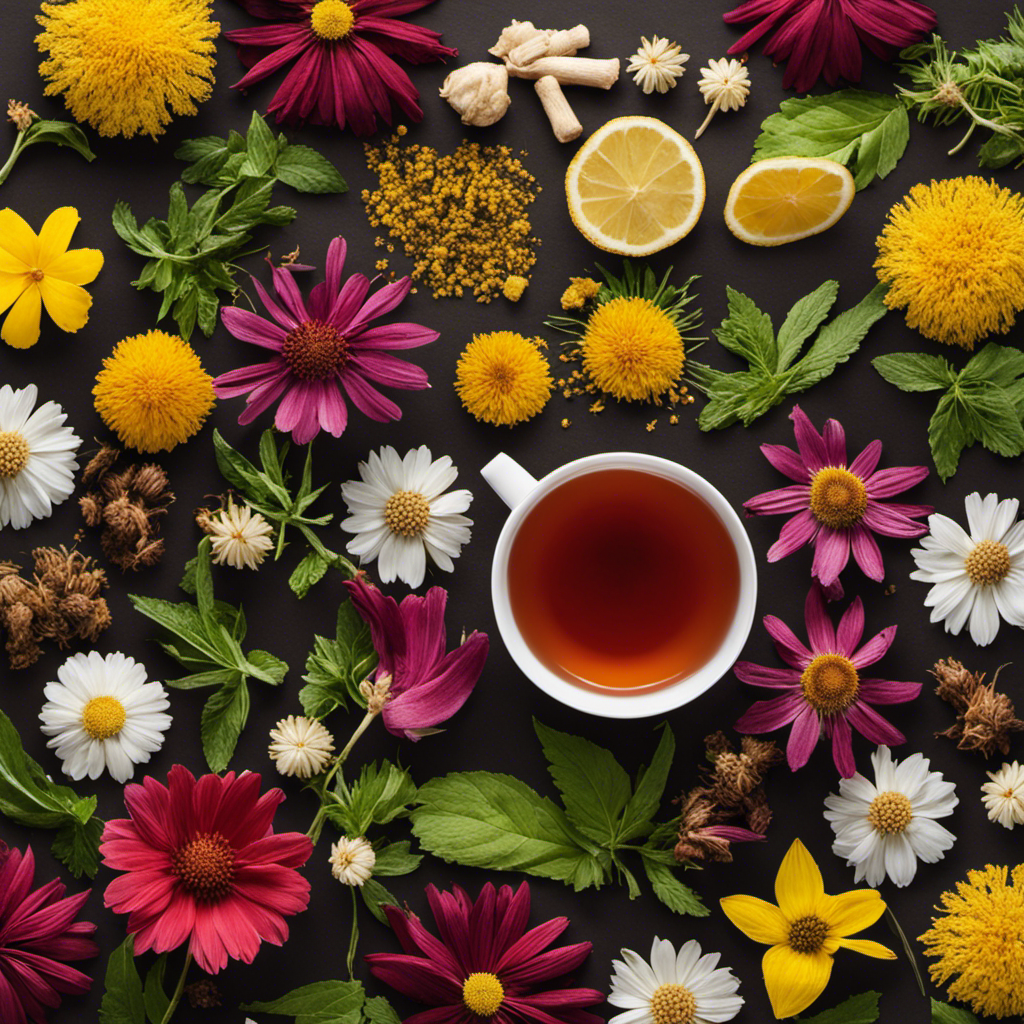
As a tea enthusiast, I have always been intrigued by the calming benefits of herbal tea. From chamomile to peppermint, hibiscus to ginger, and echinacea to dandelion, these teas provide distinct properties that address specific needs.
Whether you’re seeking relaxation, healing, or a boost in immunity, herbal teas have it all. In this article, we’ll explore the benefits of chamomile tea, the digestive powerhouse of peppermint tea, and so much more.
So grab a cup, sit back, and let’s uncover the comforting world of herbal tea together.
Key Takeaways
- Chamomile tea promotes relaxation and reduces anxiety, making it a great option for those seeking a sense of calmness.
- Peppermint tea aids in digestion and provides relief from stomach issues such as spasms and cramps.
- Hibiscus tea improves heart health and boosts the immune system with its high vitamin C content.
- Ginger tea soothes nausea and reduces inflammation in the body, offering long-term benefits for overall well-being.
The Soothing Benefits of Chamomile Tea
I love how chamomile tea soothes my mind and helps me relax after a long day. Chamomile tea is well-known for its calming effects on the body and mind. It has been used for centuries to promote relaxation and reduce anxiety.
Research has shown that chamomile tea contains compounds that bind to certain receptors in the brain, promoting a sense of calmness and tranquility. In addition to its soothing properties, chamomile tea also offers other health benefits. It can help with sleep disorders, digestive issues, and even skin conditions.
This herbal tea is packed with antioxidants and anti-inflammatory compounds that support overall well-being. Whether you’re looking to unwind after a stressful day or improve your sleep quality, a cup of chamomile tea can be a nurturing and soothing addition to your routine.
Peppermint Tea: A Digestive Powerhouse
Peppermint tea, with its refreshing flavor and soothing properties, is known as a digestive powerhouse that can help relieve bloating and improve overall digestion. Here are three key reasons why peppermint tea is a great choice for those seeking digestive relief:
-
Anti-inflammatory properties: Peppermint tea contains menthol, which helps relax the muscles of the gastrointestinal tract, reducing inflammation and easing digestion.
-
Calming effect: The natural compounds in peppermint tea have a relaxing effect on the stomach, reducing spasms and cramps that can cause discomfort.
-
Bloating relief: Peppermint tea has been shown to help alleviate bloating by reducing gas and promoting the passage of food through the digestive system.
By harnessing the healing properties of peppermint tea, individuals can find relief from digestive issues and enjoy improved overall well-being.
Now, let’s explore the next remarkable herbal tea – hibiscus tea – and its incredible healing benefits.
Harnessing the Healing Properties of Hibiscus Tea
By exploring the healing properties of hibiscus tea, individuals can uncover its potential for soothing and healing various ailments.
Hibiscus tea, derived from the vibrant and beautiful hibiscus flower, has been used for centuries in traditional medicine for its numerous health benefits. Packed with antioxidants, hibiscus tea has been shown to lower blood pressure, reduce inflammation, and improve heart health.
Additionally, its high vitamin C content boosts the immune system and aids in the prevention of illnesses. Incorporating hibiscus tea into your daily routine can be as simple as brewing a cup in the morning or sipping on it throughout the day.
Its naturally sweet and tart flavor makes it a refreshing beverage choice, and its potential healing power makes it a valuable addition to any wellness regimen.
Ginger Tea: Nature’s Remedy for Nausea and Inflammation
Ginger tea is a soothing and effective remedy for nausea and inflammation, often providing relief when consumed regularly.
As a natural remedy for motion sickness, ginger tea has been used for centuries to alleviate symptoms such as dizziness and nausea. It works by calming the stomach and reducing the feeling of queasiness.
Additionally, ginger tea is known for its ability to reduce inflammation in the body. This is due to the presence of gingerols, which have been shown to have anti-inflammatory properties. By reducing inflammation, ginger tea can help relieve symptoms associated with conditions such as arthritis and digestive disorders.
Regular consumption of ginger tea can provide long-term benefits for those seeking relief from nausea and inflammation.
Echinacea and Dandelion Teas: Boosting Immunity and Detoxification
I love drinking echinacea and dandelion teas because they boost my immunity and help detoxify my body. Echinacea tea is known for its immune-enhancing properties and can help prevent and fight off infections. Dandelion tea, on the other hand, acts as a natural diuretic, promoting detoxification by flushing out toxins from the body.
Incorporating these teas into my daily routine has had a positive impact on my overall well-being. To illustrate the benefits of echinacea and dandelion teas, I have prepared a table below:
| Tea | Boosting Immunity | Detoxification |
|---|---|---|
| Echinacea | Enhances immune function | Supports toxin removal |
| Dandelion | Strengthens immune system | Aids in detoxifying |
Frequently Asked Questions
Are There Any Potential Side Effects or Risks Associated With Drinking Chamomile Tea?
Drinking chamomile tea has potential side effects and risks. While generally safe, it can cause allergic reactions, interact with medications, and increase the risk of bleeding. It’s important to consult a healthcare professional before consuming chamomile tea.
How Does Peppermint Tea Help With Digestion and What Specific Digestive Issues Can It Alleviate?
Peppermint tea helps with digestion by soothing the digestive tract and relieving symptoms like bloating and gas. It can alleviate specific issues such as irritable bowel syndrome (IBS) and indigestion.
Can Hibiscus Tea Help Lower Blood Pressure and Improve Heart Health?
Hibiscus tea has many benefits, including potentially lowering blood pressure and improving heart health. Its natural properties make it a great addition to a healthy lifestyle. Consider incorporating hibiscus tea into your routine for these potential advantages.
What Are the Specific Health Benefits of Ginger Tea for Nausea and Inflammation?
Ginger tea is known for its soothing qualities and healing properties. It can provide relief from nausea and inflammation, making it a great choice for those with digestive issues or seeking inflammation relief.
How Do Echinacea and Dandelion Teas Support the Immune System and Aid in Detoxification?
Echinacea and dandelion teas support the immune system and aid in detoxification. They have unique properties that promote overall health. Their benefits include boosting immunity and helping the body eliminate toxins.
Conclusion
In conclusion, herbal teas such as chamomile, peppermint, hibiscus, ginger, echinacea, and dandelion offer a wide range of soothing, relaxing, and healing qualities.
Chamomile tea aids in sleep and relaxation, while peppermint tea promotes digestion.
Hibiscus tea harnesses healing properties, and ginger tea is a natural remedy for nausea and inflammation.
Echinacea and dandelion teas boost immunity and aid in detoxification.
Incorporating these teas into your daily routine can provide numerous health benefits.
So go ahead, sip on these herbal wonders and let nature work its magic.
Arf, an author and an innovative enthusiast of coffee, coffee alternatives, and tea, plays a crucial role as a contributor to the esteemed Cappuccino Oracle platform. Renowned for his curiosity and passion for these captivating beverages, Arf has carved out a unique space for himself in the world of exploration and writing. He realized that coffee, coffee alternatives, and tea are not mere drinks to keep one awake, but universes of flavors and stories waiting to be explored.
Arf’s articles for Cappuccino Oracle blend meticulous research with personal experiences, providing readers with an in-depth understanding of various types of coffee, coffee alternatives, and tea, along with their unique characteristics, cultures, and histories. His honest reviews and engaging narratives guide readers on their own journeys, helping them discover their preferences and find their perfect brew.
Herbal Tea
Why Is Herbal Tea Not Real Tea
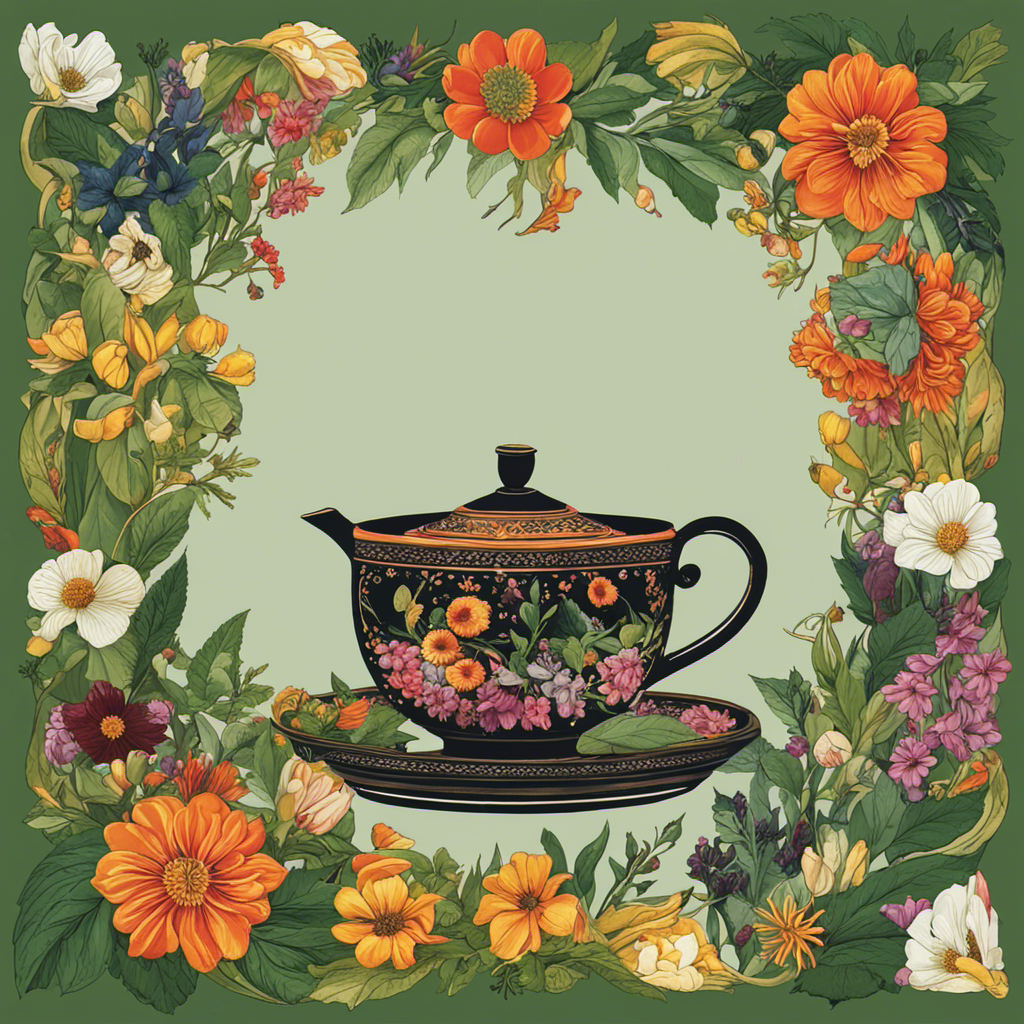
The adage, ‘Not all teas are created equal,’ perfectly encapsulates the world of herbal tea. It might come as a surprise to many that herbal tea doesn’t fall under the category of what’s traditionally recognized as ‘real’ tea. So, what’s the reason behind this? Allow me to explain it to you.
Traditional tea, such as black, green, or oolong, is derived from the leaves of the Camellia sinensis plant. It undergoes a specific process of oxidation and fermentation, which gives it that distinct flavor and caffeine content.
On the other hand, herbal tea is made from various plants, flowers, and herbs, like chamomile or peppermint, which are steeped in hot water. These herbal infusions offer a wide range of flavors and potential health benefits, but they lack the true tea leaves and caffeine found in traditional tea.
So, while herbal tea may not be classified as ‘real’ tea, it certainly has its own unique charm and allure.
Key Takeaways
- Herbal tea is not made from the Camellia sinensis plant.
- Herbal tea lacks true tea leaves and caffeine found in traditional tea.
- Herbal tea is made from various plants, flowers, and herbs.
- Herbal tea offers a wide range of flavors and potential health benefits.
The Difference Between Herbal Tea and Traditional Tea
There exists a discernible distinction between herbal tea and traditional tea. Traditional tea, also known as true tea, is made from the leaves of the Camellia sinensis plant. It includes varieties like green tea, black tea, oolong tea, and white tea.
On the other hand, herbal tea is not made from the Camellia sinensis plant but is instead made from a combination of herbs, flowers, fruits, and spices. This fundamental difference in ingredients leads to variations in taste, aroma, and health benefits.
Traditional tea contains caffeine and antioxidants, while herbal tea is typically caffeine-free and often offers unique therapeutic properties depending on the herbs used.
Both traditional tea and herbal tea have their own merits, but which one is better ultimately depends on individual preferences and health needs. Understanding traditional tea, however, provides a deeper insight into the world of tea beyond herbal alternatives.
Understanding Traditional Tea
When it comes to traditional tea, one must understand the importance of the Camellia sinensis plant. This plant is the foundation of all true teas, including green, black, white, and oolong teas.
Each of these teas is unique in its flavor, aroma, and health benefits, making traditional tea a fascinating and diverse world to explore.
The Camellia sinensis plant
You might be surprised to learn that the Camellia sinensis plant is the secret ingredient that gives real tea its authentic flavor and aroma. Cultivated in various regions around the world, including China, India, and Japan, the camellia sinensis plant is the foundation of traditional tea production.
The leaves of this plant are carefully harvested, processed, and brewed to create the different types of traditional tea that we enjoy. The specific cultivation methods, such as the climate, soil conditions, and altitude, all contribute to the unique characteristics of each tea variety.
From delicate white tea to robust black tea, the camellia sinensis plant is responsible for the vast array of flavors and aromas found in traditional tea. Transitioning into the subsequent section about different types of traditional tea, it’s fascinating to explore the diverse world of tea varieties and their distinct qualities.
Different types of traditional tea
Let’s delve into the fascinating realm of traditional tea and discover the diverse array of flavors and aromas that different types offer. Traditional tea, derived from the leaves of the Camellia sinensis plant, has a rich history and cultural significance that has been passed down through generations. There are several types of traditional tea, each with its own distinct characteristics and brewing techniques. To provide a visual representation of these ideas, I have created a table below:
| Type of Tea | Flavor Profile | Brewing Technique |
|---|---|---|
| Green Tea | Fresh, grassy | Steep at 175°F |
| Black Tea | Bold, robust | Steep at 212°F |
| Oolong Tea | Floral, fruity | Steep at 195°F |
These traditional teas have long been cherished for their unique tastes and aromas, and their brewing techniques vary to bring out the best in each type. Now, let’s explore the variety of herbal tea options and their distinctions in the subsequent section.
The Variety of Herbal Tea Options
When it comes to herbal tea, there’s a wide variety of options to choose from. These teas are made from plants, herbs, fruits, and spices. Each offers unique flavors and health benefits.
Whether it’s a calming chamomile, a refreshing peppermint, or a soothing lavender, there’s an herbal tea for every taste and need.
Plants, herbs, fruits, and spices used
Although herbal tea doesn’t contain tea leaves, it can still be enjoyed as a hot beverage made from various plants, herbs, fruits, and spices. Here are four examples of popular ingredients used in herbal teas:
-
Chamomile: Known for its calming properties, chamomile tea is often consumed before bed to promote a restful sleep.
-
Peppermint: With its refreshing and soothing qualities, peppermint tea is a popular choice for relieving digestive discomfort.
-
Hibiscus: This vibrant flower is used to create a tart and tangy herbal tea that’s rich in antioxidants.
-
Ginger: Known for its spicy and warming flavor, ginger tea is often enjoyed for its potential anti-inflammatory and digestive benefits.
These diverse ingredients not only provide unique flavors but also offer various health benefits.
Transitioning into the next section, let’s explore the incredible range of flavors and the potential health benefits herbal teas have to offer.
Unique flavors and health benefits
After discussing the various plants, herbs, fruits, and spices used in herbal tea, let’s now explore the unique flavors and therapeutic effects that make this beverage so popular.
One of the fascinating aspects of herbal tea is its wide range of flavors. From the refreshing taste of mint to the soothing aroma of chamomile, each herbal infusion offers a distinct and delightful experience for the taste buds. Not only do these flavors provide a pleasant sensory experience, but they also have therapeutic effects on the body.
For example, lavender tea is known for its calming properties, while ginger tea is often used to aid digestion. These health benefits make herbal tea a popular choice for those seeking a natural approach to wellness.
Now, let’s delve into the absence of caffeine in herbal tea and its impact on our bodies.
The Absence of Caffeine in Herbal Tea
When it comes to herbal tea, one key point to consider is the absence of caffeine. As someone who prefers to avoid caffeine, I appreciate having natural alternatives to choose from.
Not only does caffeine-free herbal tea provide a calming and soothing experience, but it also offers various health benefits, making it a great option for those looking for a refreshing and caffeine-free beverage.
Natural alternatives to caffeine
If you’re looking for a natural alternative to caffeine, herbal tea can be a great option for you. Here are some natural energy boosters that can help you reduce your caffeine intake:
-
Matcha Green Tea: This powdered tea is rich in antioxidants and contains a small amount of caffeine. It provides a gentle energy boost without the jitters.
-
Ginseng Tea: Ginseng is known for its ability to improve mental focus and increase energy levels. It can be a great caffeine-free alternative for those looking for a natural pick-me-up.
-
Peppermint Tea: Peppermint has a refreshing and invigorating effect. It can help increase alertness and provide a natural energy boost.
-
Rooibos Tea: This herbal tea is caffeine-free and packed with antioxidants. It can help reduce fatigue and promote overall well-being.
Incorporating these natural alternatives into your routine can be a great way to enjoy the benefits of caffeine-free options.
Benefits of caffeine-free options
By incorporating natural alternatives to caffeine into your routine, you can enjoy the numerous benefits of opting for caffeine-free options. Not only do these alternatives provide a healthier way to stay energized, but they also offer additional wellness benefits. One popular option is herbal tea, which is a flavorful and soothing alternative to traditional tea. Herbal teas are caffeine-free and can be enjoyed throughout the day without the worry of disrupting your sleep or causing jitters. They come in a variety of flavors and blends, each with its own unique health properties. For example, chamomile tea is known for its calming effects, while peppermint tea can aid digestion. By exploring the world of caffeine-free alternatives, you can find a herbal tea that suits your taste and supports your overall well-being. Transitioning into the next section, herbal tea can also be a great relaxation aid.
Herbal Tea as a Relaxation Aid
Herbal tea is a fantastic relaxation aid due to its calming and soothing properties. It can help to calm the mind and body, promoting a sense of tranquility and peace.
Additionally, herbal tea has been found to promote better sleep, allowing for a more restful and rejuvenating night’s rest.
Lastly, herbal tea can provide stress relief, helping to reduce feelings of anxiety and tension. So, if you’re looking for a natural way to relax and unwind, a cup of herbal tea might be just what you need.
Calming and soothing properties
The calming and soothing properties of herbal tea can provide a sense of tranquility and relaxation. Herbal teas are known for their ability to calm the mind and body, promoting a feeling of peace and serenity.
Here are five ways in which herbal tea can help you achieve a deeper sense of calm and relaxation:
- Chamomile tea is renowned for its calming effects, helping to reduce anxiety and promote relaxation.
- Lavender tea has a soothing aroma that can ease stress and help you unwind after a long day.
- Peppermint tea can provide a cooling sensation that relaxes both the body and mind.
- Lemon balm tea has natural sedative properties that can help alleviate restlessness and promote a peaceful sleep.
- Valerian root tea is known for its calming effects on the nervous system, helping to relieve tension and anxiety.
By incorporating these calming teas and soothing herbs into your daily routine, you can promote better sleep and stress relief.
Promoting better sleep and stress relief
Imagine sinking into a soft bed of clouds, your worries melting away as you drift into a deep and restful sleep. Herbal tea has been known to promote better sleep and reduce anxiety, making it a popular choice for those seeking a natural remedy for sleep troubles.
Certain herbs, such as chamomile and valerian root, contain compounds that have a calming effect on the nervous system, helping to induce relaxation and ease tension. These herbs can also help reduce anxiety, allowing the mind to quiet down and prepare for a restful night’s sleep.
Additionally, herbal teas are caffeine-free, which is essential for those sensitive to stimulants that can interfere with sleep. So, if you’re looking for a natural way to improve your sleep quality and reduce stress, herbal tea may be the perfect solution.
Transitioning into exploring the health benefits of herbal tea, let’s delve deeper into its various advantages.
Exploring the Health Benefits of Herbal Tea
When it comes to herbal tea, there are two key points to consider: its antioxidant properties and the targeted health benefits of different herbs.
Herbal teas are known for their high levels of antioxidants, which help protect the body from free radicals and reduce the risk of chronic diseases.
Additionally, different herbs used in herbal teas offer specific health benefits. For example, chamomile is known for its relaxation properties, peppermint aids in digestion, and ginger boosts immunity.
So, not only do herbal teas provide a delightful beverage option, but they also offer a range of health benefits depending on the herbs used.
Antioxidant properties
Contrary to popular belief, herbal tea lacks the same antioxidant properties as real tea. While real tea, such as green tea, is packed with antioxidant-rich ingredients like catechins and polyphenols, herbal tea is made from a variety of herbs, fruits, and flowers that don’t contain the same levels of antioxidants. To better illustrate this point, let’s compare the antioxidant content of green tea and some common herbal teas in the table below:
| Tea Type | Antioxidant Content |
|---|---|
| Green tea | High |
| Chamomile tea | Low |
| Peppermint tea | Moderate |
As you can see, green tea has a high antioxidant content, while herbal teas like chamomile and peppermint have lower levels. This distinction is important because antioxidants play a crucial role in protecting our cells from damage caused by free radicals. Moving forward, we will explore the targeted health benefits of different herbs, highlighting their unique properties.
Targeted health benefits of different herbs
Discover the diverse and distinct health benefits of different herbs, harnessing their healing powers and promoting overall well-being. Each herb possesses targeted health benefits that can address specific health concerns.
For example, chamomile is known for its calming properties and can help alleviate anxiety and promote better sleep. Peppermint is commonly used to soothe digestive issues such as bloating and indigestion. Ginger is well-regarded for its anti-inflammatory properties and can aid in reducing muscle pain and improving digestion. Echinacea is often used to boost the immune system and fight off colds and flu.
These targeted health benefits make herbal remedies a popular choice for those seeking natural alternatives to traditional medicine. Transitioning into the subsequent section, let’s explore the benefits of herbal tea for digestive health.
Herbal Tea for Digestive Health
To improve your digestive health, herbal tea can be a beneficial choice as it doesn’t contain caffeine and can have soothing properties. Certain herbs used in herbal teas, like peppermint, ginger, and chamomile, have traditionally been used to aid digestion and relieve digestive discomfort.
Peppermint tea, for example, is known for its ability to relax the muscles of the gastrointestinal tract and reduce symptoms like bloating and indigestion. Ginger tea can help stimulate digestion and alleviate nausea. Chamomile tea has anti-inflammatory properties that can soothe an irritated digestive system.
In addition to these targeted benefits, herbal teas can also contribute to overall wellness. They can be a part of a healthy lifestyle, along with a balanced diet and regular exercise, to support digestive health and promote overall well-being.
Incorporating Herbal Tea into a Healthy Lifestyle
Incorporating herbal tea into a healthy lifestyle can be a refreshing and comforting way to support digestive health and promote overall well-being. Not only does herbal tea provide hydration, but it can also aid in weight loss by curbing appetite and boosting metabolism.
Many herbal teas, such as green tea and oolong tea, contain compounds that’ve been shown to increase fat burning and improve insulin sensitivity. Additionally, certain herbal teas, like chamomile and peppermint, have been used for centuries to soothe digestive issues such as bloating and indigestion.
Furthermore, herbal teas are rich in antioxidants, which can help boost the immune system and protect against harmful free radicals. By incorporating herbal tea into a weight loss plan and utilizing its immune-boosting properties, individuals can enhance their overall health and well-being.
Frequently Asked Questions
Can herbal tea be considered a true tea?
Herbal tea cannot be considered a true tea because it is not made from the Camellia sinensis plant. However, it does have health benefits and cultural significance due to its use in traditional medicine and various cultural practices.
How is traditional tea different from herbal tea?
Traditional tea and herbal tea differ in their brewing process and health benefits. Traditional tea is made from the Camellia sinensis plant, while herbal tea is made from herbs, fruits, and flowers.
What are the various options available in terms of herbal tea flavors?
There are numerous options when it comes to herbal tea flavors. Some examples include chamomile, peppermint, ginger, and hibiscus. Each type offers its own unique taste and potential health benefits.
Does herbal tea contain caffeine?
Yes, herbal tea can contain caffeine. However, it varies depending on the herbs used. Herbal tea has health benefits like improving digestion and reducing stress. Potential side effects include allergies or interactions with certain medications.
Can herbal tea help with weight loss?
Herbal tea can potentially aid in weight loss due to its natural ingredients and low-calorie content. It offers numerous benefits, such as boosting metabolism and reducing inflammation. Try incorporating herbal tea into your routine with these delicious herbal tea recipes.
Conclusion
In conclusion, herbal tea may not be considered ‘real tea’ in the traditional sense, but it offers a world of flavors and health benefits that shouldn’t be overlooked. So, next time you’re looking for a soothing and caffeine-free beverage, why not give herbal tea a try? It’s like adding a splash of color to your daily routine, transporting you to a tranquil garden oasis where time slows down and worries melt away. Embrace the herbal tea revolution and elevate your tea-drinking experience to new heights. Cheers to a healthier and more relaxed you!
Noah, the Editor-in-Chief at Cappuccino Oracle, plays a pivotal role in shaping the voice and vision of our renowned platform. With an unwavering passion for coffee, coffee alternatives, and tea, Noah leads Cappuccino Oracle towards new horizons in the realm of coffee journalism.
Beyond his professional responsibilities, Noah serves as a mentor and guiding force for his team. His dedication to journalistic excellence and genuine love for coffee, coffee alternatives, and tea continue to inspire and motivate the Cappuccino Oracle family. In the ever-evolving world of these beverages, Noah’s leadership ensures that our platform remains at the forefront, delivering enlightening and enjoyable content to our readers worldwide.
Herbal Tea
Why Drinking Herbal Tea Is Better Than Coffee

Sitting here with a steaming herbal tea in hand, I find myself utterly captivated by its soothing scent and how it gently warms my spirit.
There’s something truly magical about herbal tea – a natural elixir that offers a multitude of health benefits. From providing a natural source of energy to its vast variety of flavors and ingredients, herbal tea is a true powerhouse.
It’s a caffeine-free option that not only hydrates but also calms and relieves stress. As I delve deeper into the world of herbal tea, I discover its antioxidant properties, making it a true champion for my overall well-being.
And the best part? It’s a sustainable and environmentally friendly choice.
So, join me on this journey as we explore why drinking herbal tea is not just a healthier option but a delightful one that nourishes both body and soul.
Key Takeaways
- Herbal tea offers a flavorful alternative to plain water, while coffee can be more bitter and strong in taste.
- Herbal tea contains antioxidants that protect against free radicals, while coffee does not have the same level of antioxidant content.
- Herbal tea has calming and stress-relieving effects, promoting mental clarity and reducing anxiety, whereas coffee can sometimes increase anxiety levels.
- Drinking herbal tea supports sustainable farming practices and reduces the need for harmful pesticides and synthetic fertilizers, making it a more environmentally friendly choice compared to coffee.
Health Benefits of Herbal Tea
You’ll love how herbal tea can boost your overall health and well-being! Herbal tea is a wonderful natural remedy that offers a wide range of health benefits.
One of the key advantages of herbal tea is its ability to support the immune system. Certain herbs like echinacea and elderberry are known for their immune-boosting properties, helping to ward off colds and flu.
Additionally, herbal teas are rich in antioxidants, which help to combat free radicals and reduce inflammation in the body. They can also aid in digestion, relieve stress, and promote relaxation.
Unlike coffee, herbal tea is caffeine-free, making it a great choice for those who are sensitive to caffeine or looking to reduce their intake.
So why not swap your cup of coffee for a delicious and healthful cup of herbal tea? Your body will thank you!
Natural Source of Energy
With its invigorating properties, herbal tea provides a natural boost of energy, setting the stage for a productive day ahead. As a caffeine alternative, herbal tea offers a natural source of energy that can help us stay alert and focused without the jitters or crashes that come with coffee.
Unlike coffee, which contains high levels of caffeine that can lead to dependency and withdrawal symptoms, herbal tea harnesses the power of natural ingredients to provide sustained energy throughout the day. Ingredients like ginseng, ginger, and peppermint are known for their energizing properties and can help improve mental clarity and concentration.
Additionally, herbal tea is rich in antioxidants, which support overall health and vitality. So, why rely on coffee when you can experience a natural energy boost with herbal tea?
Variety of Flavors and Ingredients
Explore a world of tantalizing flavors and irresistible ingredients that will leave your taste buds craving more. Herbal tea offers a wide variety of flavorful blends that can satisfy any palate. From soothing chamomile to invigorating peppermint, there is a herbal tea for every mood and occasion. These teas are created by combining different herbs and botanicals, resulting in a unique and refreshing taste experience. Moreover, herbal teas are often made with natural ingredients that have been used for centuries as herbal remedies. This means that not only are you enjoying a delicious beverage, but you are also benefiting from the healing properties of these herbs. So why settle for a plain cup of coffee when you can explore the world of herbal tea and indulge in its flavorful blends and herbal remedies?
| Flavors | Ingredients | Benefits |
|---|---|---|
| Chamomile | Chamomile flowers | Calming and aids in sleep |
| Peppermint | Peppermint leaves | Refreshing and aids in digestion |
| Lavender | Lavender buds | Relaxing and helps reduce stress |
Antioxidant Powerhouse
When it comes to the antioxidant powerhouse of herbal tea, I can personally attest to its ability to fight free radicals and promote overall well-being.
The high concentration of antioxidants in herbal tea helps to neutralize harmful free radicals in the body, reducing the risk of chronic diseases.
Additionally, the diverse range of herbs and plants used in herbal tea provide a holistic approach to improving overall health, offering a natural and nourishing solution for optimal well-being.
Fights Free Radicals
Drinking herbal tea is a great way to combat free radicals and protect your body. Not only does herbal tea taste delicious, but it also contains powerful antioxidants that can help fight inflammation and boost your immune system. One of the main benefits of herbal tea is its ability to fight free radicals. Free radicals are unstable molecules that can damage cells and contribute to various diseases. By consuming herbal tea regularly, you can provide your body with a rich source of antioxidants that help neutralize these harmful molecules. To give you a better understanding of the antioxidant power of herbal tea, here is a comparison table showcasing the antioxidant content of popular herbal teas:
| Herbal Tea | Antioxidant Content | Benefits |
|---|---|---|
| Green Tea | High | Fights inflammation, supports heart health |
| Chamomile Tea | Moderate | Promotes relaxation, aids sleep |
| Rooibos Tea | Low | Soothes digestion, supports healthy skin |
By incorporating herbal tea into your daily routine, you can enjoy its many benefits and give your body the protection it needs against free radicals.
Promotes Overall Well-being
Incorporating herbal tea into your daily routine can leave you feeling rejuvenated and ready to take on the day. Not only does herbal tea offer a delicious and comforting alternative to coffee, but it also promotes overall well-being.
Herbal teas, such as chamomile and peppermint, have been used for centuries to support digestion and promote a healthy gut. These teas contain natural compounds that can soothe an upset stomach, relieve bloating, and even alleviate symptoms of irritable bowel syndrome. By promoting digestion, herbal tea can help you maintain a healthy and happy digestive system.
Additionally, herbal tea is rich in antioxidants, which can help boost your immune system. Antioxidants are known for their ability to fight free radicals in the body, reducing the risk of chronic diseases and boosting overall health. By incorporating herbal tea into your daily routine, you can give your immune system the support it needs to keep you feeling your best.
In summary, drinking herbal tea promotes digestion and boosts the immune system, making it a great choice for those looking to improve their overall well-being. So why not swap out your morning cup of coffee for a soothing cup of herbal tea? Your body will thank you.
Hydration Benefits
Sipping herbal tea is a delightful way to keep your body hydrated and nourished. Not only does herbal tea provide hydration benefits, but it can also aid in weight loss.
Unlike coffee, which can be dehydrating, herbal teas are made from plants and contain natural compounds that promote hydration. These teas are typically caffeine-free, allowing you to stay hydrated without any negative effects.
Additionally, certain herbal teas, such as green tea and oolong tea, have been found to boost metabolism and promote weight loss. These teas contain antioxidants called catechins, which can help increase fat burning and improve overall body composition.
So, if you’re looking for a refreshing and healthy way to stay hydrated and support your weight loss goals, herbal tea is the perfect choice.
Caffeine-Free Option
Indulge in the delightful embrace of a caffeine-free herbal elixir, soothing your senses and giving your body the nourishment it craves. When it comes to beverage options, caffeine alternatives can provide a soothing and calming experience.
Here are four reasons why choosing a caffeine-free herbal tea over coffee can be a wise choice:
-
Relaxation: Herbal teas like chamomile, lavender, and peppermint are known for their calming properties, helping to reduce stress and promote relaxation.
-
Improved Sleep: Unlike coffee, herbal teas don’t contain caffeine, making them a great choice for those looking to improve their sleep quality and quantity.
-
Hydration: Herbal teas are a great way to stay hydrated throughout the day, as they provide a flavorful alternative to plain water.
-
Antioxidant Boost: Many herbal teas contain antioxidants, which can help protect your body against free radicals and promote overall health.
Incorporating caffeine-free herbal teas into your daily routine can provide a soothing and nourishing experience, offering an array of benefits for both your mind and body.
Calming and Stress-Relieving Effects
When it comes to relaxing and unwinding, herbal tea is my go-to beverage. The calming and stress-relieving effects of herbal tea are well-known and have been supported by research. It helps reduce anxiety and promotes mental clarity, allowing me to feel more at ease and focused throughout the day.
Relax and Unwind with Herbal Tea
Kick back and let herbal tea help you unwind and relax. Herbal tea is a great way to create a calming routine and find moments of tranquility in our busy lives. When it comes to relaxation techniques and mindfulness practices, herbal tea can be a valuable tool.
Here are a few reasons why herbal tea is the perfect companion for relaxation:
-
Variety: There are countless flavors and blends of herbal tea to choose from, allowing you to find the perfect taste that helps you unwind.
-
Aromatherapy: The soothing aroma of herbal tea can have a positive impact on our mood and help us relax.
-
Ritual: Preparing a cup of herbal tea can become a mindful ritual, allowing us to slow down, focus on the present moment, and let go of stress.
So next time you need to relax and unwind, reach for a cup of herbal tea and let its calming effects wash over you.
Reduce Anxiety and Promote Mental Clarity
Immerse yourself in a soothing oasis of calmness and clarity with the gentle embrace of nature’s elixir. Herbal tea, a natural remedy, has been shown to reduce anxiety and promote mental clarity.
Unlike coffee, which can sometimes leave you feeling jittery and on edge, herbal tea contains compounds that have a calming effect on the mind and body. Research has found that certain herbs, such as chamomile and lavender, have anxiety-reducing properties, helping to relax the nervous system and alleviate stress.
Additionally, herbal tea can improve focus and mental clarity. The antioxidants found in herbal tea, such as catechins and flavonoids, have been linked to enhanced cognitive function and improved attention span.
So, if you’re looking for a beverage that can help you unwind and stay focused, herbal tea is the perfect choice.
Sustainable and Environmentally Friendly
Choosing herbal tea over coffee isn’t just a healthier choice, but also a more sustainable and environmentally friendly one.
When it comes to sustainable farming, herbal teas are often cultivated using organic and natural methods. Farmers use techniques like composting and crop rotation, which help maintain soil fertility and reduce the need for harmful pesticides and synthetic fertilizers.
Additionally, herbal teas are often packaged in eco-friendly materials such as biodegradable tea bags or loose leaf options that minimize waste.
By opting for herbal tea, you’re not only benefiting your own health but also supporting sustainable farming practices and reducing your environmental footprint.
So next time you reach for a beverage, consider the sustainable and eco-friendly option of herbal tea.
Frequently Asked Questions
What are some common herbal tea flavors and ingredients?
There are a variety of herbal tea flavors and ingredients, each with unique health benefits. Some popular types include chamomile for relaxation, peppermint for digestion, and ginger for immunity. Choose the one that suits your needs best.
How does herbal tea compare to coffee in terms of hydration benefits?
Herbal tea is equally hydrating as coffee, but with added benefits. While coffee can lead to dehydration due to its diuretic properties, herbal teas like chamomile and hibiscus can help maintain hydration levels and provide antioxidants for overall well-being.
Can herbal tea provide a sustainable and environmentally friendly alternative to coffee?
Herbal tea can provide a sustainable and environmentally friendly alternative to coffee. Its production requires less water, land, and energy compared to coffee, reducing the overall environmental impact.
Are there any potential side effects or risks associated with drinking herbal tea?
Potential health risks associated with drinking herbal tea include allergic reactions, interactions with medications, and contamination. Long-term effects are uncertain due to limited research, but moderation and consulting a healthcare provider can help minimize any potential risks.
How does herbal tea help in calming and relieving stress?
Herbal tea helps calm and relieve stress by promoting relaxation and reducing anxiety. It has been shown to improve sleep quality and enhance mental well-being, offering holistic benefits for relaxation and stress relief.
Conclusion
In conclusion, after exploring the numerous health benefits of herbal tea, it’s clear that choosing this beverage over coffee is a wise decision. Just like a gentle breeze in a serene meadow, herbal tea provides a natural source of energy without the jitters and crashes associated with coffee. Its variety of flavors and ingredients symbolize the diverse and holistic approach to wellness.
With its antioxidant power and hydration benefits, herbal tea truly nourishes both the body and the soul. So, why not sip on a cup of herbal tea and embrace a healthier, more sustainable lifestyle?
Noah, the Editor-in-Chief at Cappuccino Oracle, plays a pivotal role in shaping the voice and vision of our renowned platform. With an unwavering passion for coffee, coffee alternatives, and tea, Noah leads Cappuccino Oracle towards new horizons in the realm of coffee journalism.
Beyond his professional responsibilities, Noah serves as a mentor and guiding force for his team. His dedication to journalistic excellence and genuine love for coffee, coffee alternatives, and tea continue to inspire and motivate the Cappuccino Oracle family. In the ever-evolving world of these beverages, Noah’s leadership ensures that our platform remains at the forefront, delivering enlightening and enjoyable content to our readers worldwide.
-

 Espresso Machines Reviews3 weeks ago
Espresso Machines Reviews3 weeks agoDeLonghi Eletta Explore: A Comprehensive Review [2025]
-

 Espresso Machines Reviews4 weeks ago
Espresso Machines Reviews4 weeks agoILAVIE 20 Bar Espresso Machine Review (2025)
-

 Espresso Machines Reviews3 weeks ago
Espresso Machines Reviews3 weeks agoSUMSATY Espresso Machine Review (2025)
-
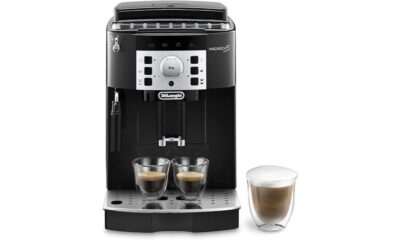
 Espresso Machines Reviews3 weeks ago
Espresso Machines Reviews3 weeks agoDeLonghi Magnifica S ECAM22.110.B Review: A Coffee Lover's Dream [2025]
-
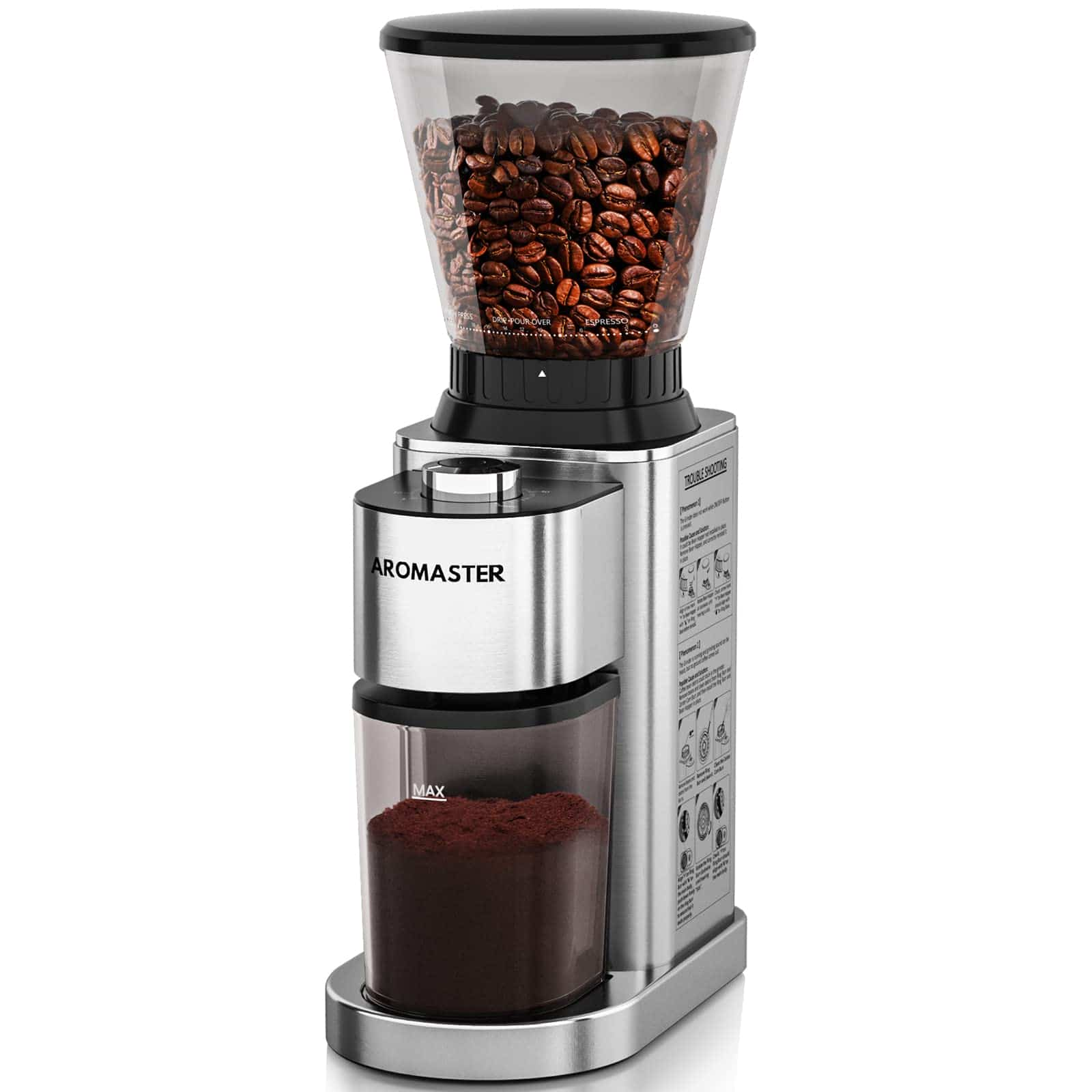
 Coffee Grinders Reviews4 weeks ago
Coffee Grinders Reviews4 weeks agoAromaster Burr Coffee Grinder Review (2025)
-

 Espresso Machines Reviews4 weeks ago
Espresso Machines Reviews4 weeks agoMAttinata Espresso Machine Review (2025)
-

 Espresso Machines Reviews4 weeks ago
Espresso Machines Reviews4 weeks agoCafe Bueno Super Automatic Espresso Machine Review (2025)
-
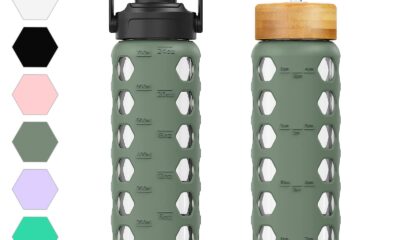
 Cappuccino Oracle Selected Reviews3 weeks ago
Cappuccino Oracle Selected Reviews3 weeks agoBest Glass Water Bottles for Eco-Friendly Hydration [2025]







